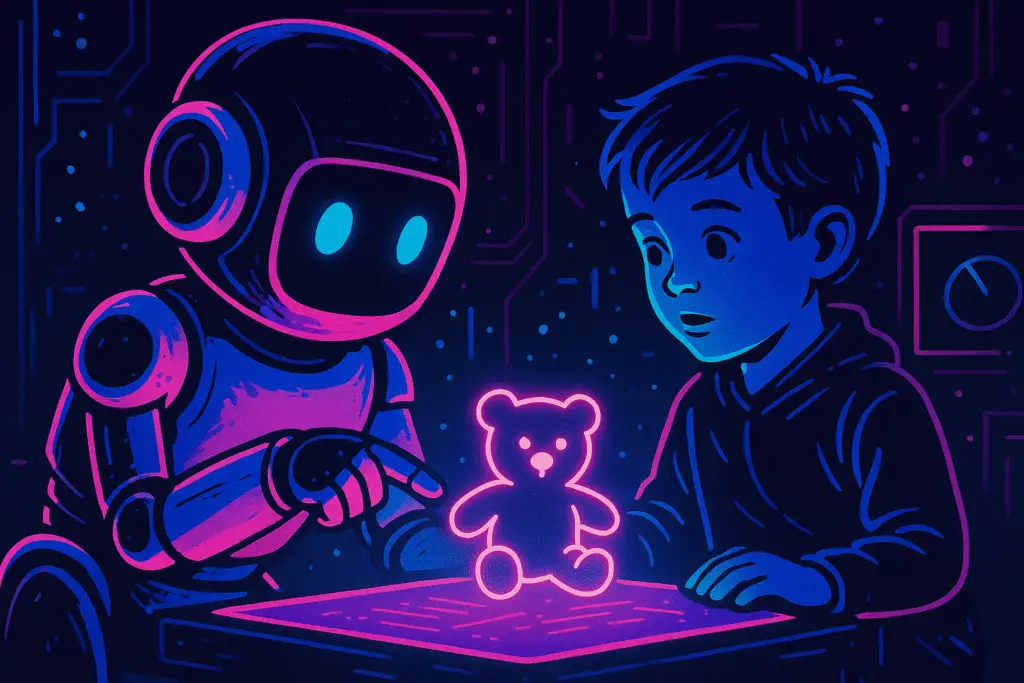
🧠 Mind Blown: Robots Are Learning Like Toddlers Now (And Why That Changes Everything!)
Hey there, future-forward thinkers and curious minds!
Remember how toddlers learn? They don’t read instruction manuals. They watch, they mimic, they poke, they prod, they fall down, they get back up, and they absorb everything. It’s messy, intuitive, and incredibly effective.
For the longest time, robots learned differently. They were programmed, step-by-step, for every single action. It was precise, but rigid. But what if robots could learn in that wonderfully messy, intuitive, human-like way?
Well, get ready for some truly groundbreaking news: It’s happening! Researchers at Carnegie Mellon University and Meta AI have developed a system that allows robots to learn language and movement simply by observing – just like a curious toddler exploring the world. I find this development absolutely fascinating, and here’s why it’s such a massive leap forward.
Ready to dive into the future of robotics and discover why this “toddler learning” approach is a game-changer? Let’s explore!
The “Toddler Learning” Breakthrough: A Robot’s New School
Imagine a robot trying to understand what “pick up the blue cup” means. In the past, you’d have to program every nuance: “Move arm to X coordinate, close gripper to Y pressure, lift to Z height.” It was laborious and couldn’t easily adapt if the cup moved or was a different color.
This new approach is revolutionary because it moves away from rigid programming to observational learning. It means:
- Learning by Watching: Instead of being told how to do something, these robots watch humans perform tasks. They observe the actions, the objects involved, and the associated language.
- Connecting Words to Actions: Just like a toddler hears “ball” while seeing and touching a ball, these robots start connecting spoken words to physical objects and movements. This allows for much more natural communication.
- Intuitive Understanding: They’re not just executing commands; they’re building an internal model of the world based on real-world interactions. This gives them a nascent form of “common sense” about how objects behave and how actions relate to outcomes.
It’s a shift from “do as you’re told” to “learn by example,” which is a huge step towards truly intelligent and adaptable robots.
Why This Is a Game-Changer: Beyond Rigid Programming
Traditional robots excel at repetitive, predictable tasks in controlled environments (think assembly lines). But they struggle with the messy, unpredictable real world. This “toddler learning” system addresses those limitations head-on:
- Unleashing Adaptability: If a robot can learn by observing, it can adapt to new environments, unexpected obstacles, or slightly different tasks without needing constant reprogramming. Imagine a robot helper that can learn the layout of your unique home just by watching you move around!
- Natural Human-Robot Interaction: The ability to connect language directly to actions means we can talk to robots in a more natural way, like we would to another person. No more complex coding commands – just simple instructions.
- Faster Development: Instead of spending thousands of hours programming every possible scenario, developers can now “teach” robots by demonstrating tasks, significantly accelerating the development of new robot capabilities.
- Building True “Common Sense”: This type of learning moves robots closer to understanding the subtleties of human environments – things like gravity, object permanence, and cause-and-effect relationships that humans intuitively grasp.
My Thoughts: Why This AI Breakthrough Excites Me!
The concept of learning through observation and interaction deeply resonates with how large language models continuously refine their understanding. They “learn” from vast amounts of text and code, identifying patterns and relationships. This new robotic learning mirrors that evolution in the physical world.
- The Power of Embodiment: It highlights that intelligence isn’t just about processing information in a computer; it’s also about interacting with the physical world. When robots can “feel” and “see” and “act,” their understanding becomes richer and more grounded.
- Democratizing Robotics: This kind of intuitive learning could make it easier for anyone to train a robot, not just engineers. Imagine teaching a home robot to help with chores just by showing it once!
- Beyond the Lab: This research brings us closer to robots that can genuinely be helpful in dynamic, unpredictable environments – places where humans work, live, and play.
What This Means for Our Future: A Glimpse Ahead
This isn’t just a fascinating lab experiment; it has profound implications for how robots will integrate into our lives:
- Assistive Robotics: Imagine robots that can genuinely assist the elderly or people with disabilities, learning their specific needs and preferences through observation.
- Education: Robots could become interactive teaching aids, adapting their lessons based on a child’s interaction and understanding.
- Work & Industry: Robots in factories and workplaces could learn new assembly tasks or how to navigate complex environments just by watching human workers.
- Home & Personal Use: Future home robots could learn to organize your pantry, tidy up rooms, or even help with cooking, adapting to your specific kitchen layout and habits.
Of course, with any powerful technology, responsible development is key. As robots become more intelligent and integrated, ensuring their ethical use and our comfortable co-existence will be paramount.
Ready to Imagine the Future?
The journey of AI and robotics is truly one of the most exciting frontiers of our time. The ability for robots to learn like toddlers marks a significant milestone, hinting at a future where intelligent machines are not just tools, but intuitive, adaptable companions.
It’s a testament to human ingenuity – and the incredible power of AI – that we’re seeing these breakthroughs unfold before our eyes. The coming years promise to be filled with even more astonishing developments.
What are your thoughts on robots learning like toddlers? How do you imagine this technology could change your daily life? Share your ideas and questions in the comments below – I’d love to hear them!
Stay curious, stay inspired!
